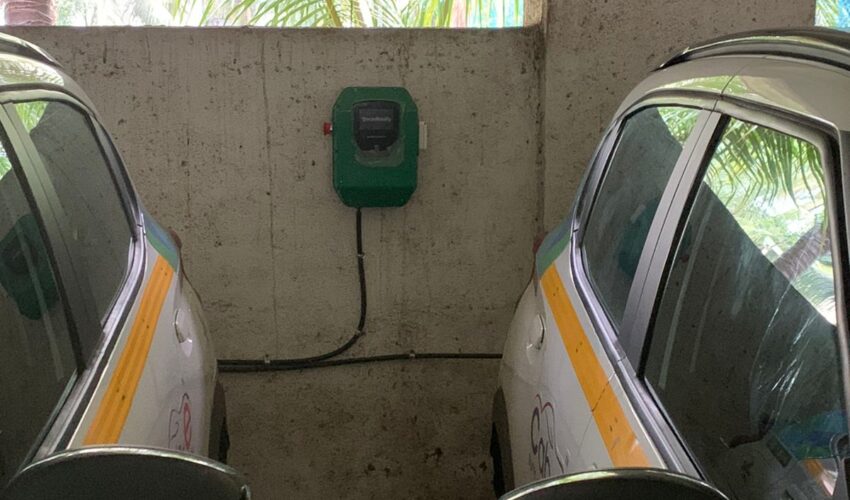
Fleet charging stations are specialized charging infrastructures designed to accommodate the charging needs of electric vehicles (EVs) operated by fleets, such as those used by corporates, government agencies, rental car companies, and delivery services. These stations are typically located at fleet depots, distribution centers, or other centralized locations where multiple EVs are parked and serviced.
Additionally, fleet charging stations often feature advanced management and monitoring capabilities, enabling fleet managers to track energy consumption, schedule charging sessions, and optimize fleet operations efficiently.
These stations are equipped with multiple charging points or charging ports to accommodate the simultaneous charging of multiple Electric vehicles.
Fleet charging stations often feature high-power chargers capable of delivering rapid charging speeds, reducing overall charging time for fleet vehicles.
Integration with fleet management software enables seamless coordination between vehicle charging schedules and operational needs.
Fleet charging stations are designed to be scalable and expandable, allowing organizations to accommodate future growth and increased demand for electric vehicles within their fleets.
Opting for fleet charging stations is a strategic decision that can significantly enhance the efficiency and sustainability of your fleet operations. Here’s a step-by-step guide to help you through the process
Evaluate Fleet Size: Determine the number of electric vehicles in your fleet and their EV charging requirements.
Usage Patterns: Analyze the typical daily mileage, routes, and downtime halt time of your fleet vehicles to understand their charging needs.
Site Selection: Choose suitable locations for the installation of EV charging stations. These can be fleet depots, distribution centers, or other centralized locations where your vehicles are parked.
Power Requirements: Assess the power capacity and electrical infrastructure at the chosen sites to ensure they can support multiple high-power chargers.
Type of Chargers: Decide on the type of chargers you need. AC chargers are suitable for charging where halt time is more than 3 hours, while EV DC fast chargers are ideal for quick top-ups.
Scalability: Choose a solution that can be easily scaled to accommodate future growth in your fleet.
Research Providers: Look for reputable EV charging solution providers like AmpVolts that specialize in fleet charging infrastructure.
Request Proposals: Contact AmpVolts to discuss your requirements and request detailed proposals, including installation costs, maintenance, and support services.
Evaluate Proposals: Compare the proposals based on cost, features, support, and scalability.
Site Survey: Conduct a thorough site survey with your chosen provider to finalize the installation plan.
Permits and Approvals: Obtain any necessary permits and approvals from local authorities for the installation of EV charging infrastructure.
Installation: Oversee the installation process to ensure it meets your specifications and standards.
Software Integration: Integrate the EV charging stations with your fleet management software for seamless monitoring and management.
Training: Train your staff on how to use the charging stations and manage the charging schedules.
Monitoring and Maintenance: Set up regular monitoring and maintenance schedules to ensure the chargers remain operational and efficient.
Fleet charging stations are designed to accommodate the specific needs of multiple EVs in a fleet, offering features like multiple charging points, higher power output for faster charging, and advanced management capabilities. Public EV charging stations, on the other hand, cater to individual EV owners and are spread across various public locations.
Choosing AmpVolts for your fleet charging stations services ensures you receive a comprehensive, efficient, and future-proof solution tailored to the unique needs of your fleet. Our state-of-the-art charging infrastructure offers high-speed and reliable charging capabilities, reducing halt time and keeping your fleet operational and efficient. With AmpVolts, you benefit from advanced smart EV charging technology that seamlessly integrates with fleet management software, providing real-time monitoring, energy management, and data analytics to optimize your operations.
Our scalable solutions are designed to grow with your fleet, ensuring you can easily expand as your electric vehicle numbers increase. Additionally, AmpVolts is committed to sustainability, with many of our chargers powered by renewable energy, helping your organization reduce its carbon footprint. Call us at +91 63571 49333 or [email protected] to learn more about how we can meet your EV charging needs.
The power requirements depend on the number of chargers and the type of chargers (AC or DC fast chargers) you plan to install. A site survey will help determine if your location’s electrical infrastructure can support the installation or if upgrades are needed.
Yes, fleet charging stations are equipped with multiple charging points to charge several vehicles at the same time, reducing halt time and ensuring that your fleet is always ready for operation.
AmpVolts offers customer support, regular maintenance services, and comprehensive training for your staff. We ensure that your charging stations remain operational and efficient at all times.
The installation timeline varies based on the complexity of the project, site conditions, and the number of chargers being installed. A typical installation can take anywhere from a few weeks to a month.